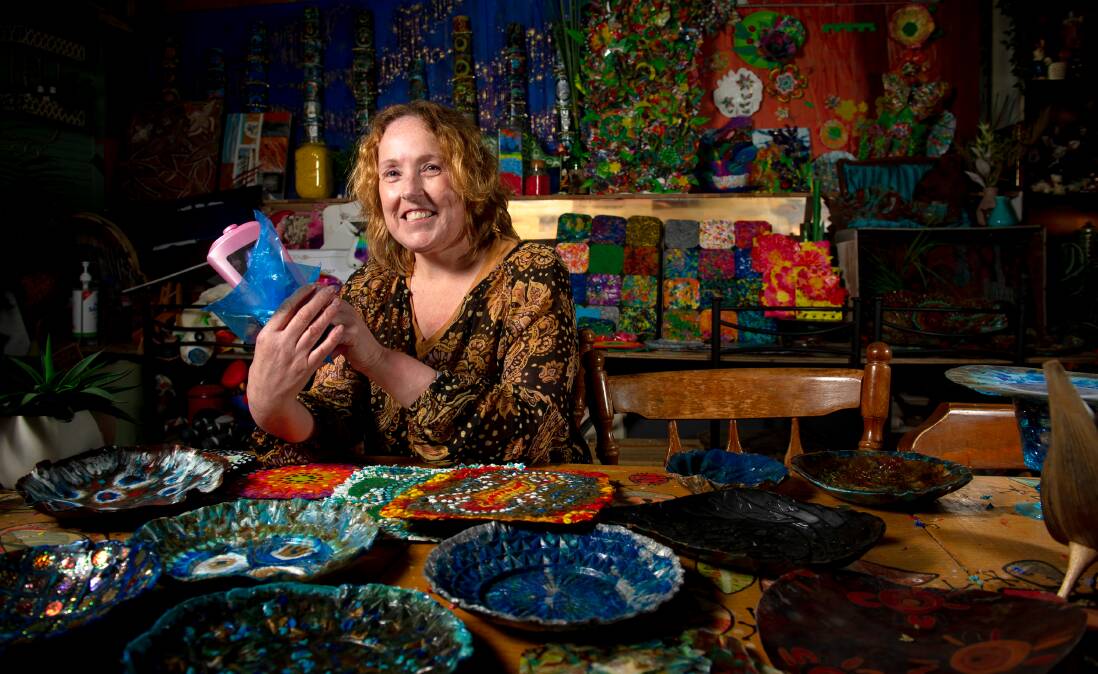
Used cooking oil from cafes in Canberra and Queanbeyan is filtered and cleaned and turned into soap then returned to the counters to be sold alongside coffees. It's the circular economy at work.
Delizia Hiltunen also buys animal fat from the EPIC markets to turn into soaps later sold amongst the stalls.
She's passing down her grandparents' recipe in workshops designed to help others find a use for fats and oils that would otherwise be discarded.
"They knew the basic chemistry of making soap, which is caustic soda, water and oil or fat and they used it in their homes," Ms Hiltunen said.
"There's so much waste from oil, but people don't have the know-how of what to do with it.
"People say 'you're giving away your secret', I'm like 'it's not a secret, it's like making bread, everyone should know how to do it'."
Canberra has scores of entrepreneurial environmentalists embracing similar circular economy strategies.
Brook Clinton from Capital Scraps collects household food scraps and turns them into compost for community gardens. Kirsty Young has opened a repair cafe in Tuggeranong encouraging customers to bring broken goods to be fixed rather than discarded. Mia Swainson is a successful sustainability consultant who brought the Zero Waste Festival to the ACT.
Waste avoidance initiatives like theirs would receive increased funding under a proposal by the Greens MLA Jo Clay, which she launched alongside leader Shane Rattenbury this week.
The discussion paper was released ahead of City Services Minister Chris Steel introducing the ACT Circular Economy Strategy later this year.
The strategy will consider how the ACT will create and support new jobs, better manage problematic waste streams and design supply chains to stop waste streams from emerging in the first place, a spokeswoman said.
Ms Clay said the ACT set a world-leading zero waste by 2010 target in the 90s, however, resource recovery has plateaued since then.
She said while a new FOGO and recycling facility were necessary, the ACT needed to reconsider the funding balance.
"We say we want to avoid waste, but our government doesn't spend much money on education, inspiration or waste avoidance," she said.

Ms Clay said many of the circular economy operators in Canberra were working with very little or no government support, while a lot was being spent on disposal.
"Many of our contracts are up for renewal so we have the opportunity to do this differently," she said.
Out at The Green Shed in Mitchell, Candice Addicoat teaches art workshops using polyethylene plastic, which is found in things like sauce, shampoo and detergent bottles.
Ms Addicoat melts down the plastic and shapes it into plates, trays and lamps.
She said it could also be used to make cubby houses or bus shelters.
"It's the most produced plastic on the planet and therefore the biggest plastic waste problem in the ocean, the environment and landfill," Ms Addicoat said.
"So this addresses our biggest plastic waste problem through creation, design and technology."
The designer also runs a charity doing free interior renovations for people doing it tough.
She said she's doing so with little or no funding.
Ms Clay said over the last 18 months she's had hundreds of conversations with the Canberra community, visiting recycling businesses and social enterprises.
"Since 2008, the Greens have held balance of power in the Assembly, and since 2012 have held Government ministries," she said.
"In that time we've made amazing progress on climate action. We lead the nation with 100 per cent renewable electricity, our plan to transition away from gas and internal combustion vehicles, and our commitment to electric vehicles.
"I'd like to see the ACT make the same progress on waste."







